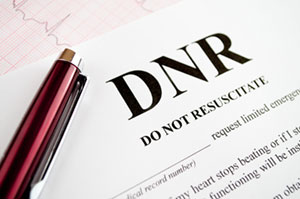By Kathryn Freeman-Jones and Diane L. Dull
 In today’s health care environment, patients are confronted by an ever-expanding myriad of technologies and treatments, leading to an increasing reliance on the clinical experience, advice and guidance of their physicians when making difficult medical decisions. Navigating the waters of health care decisions with patients can be challenging, especially in the midst of increasing patient loads, decreased and restrictive reimbursements, and the implementation of electronic health records, all of which impact health care providers’ available “face time” with patients. However, failing to engage patients in conversations about their priorities and treatment preferences and encouraging them to complete an advance directive and to appoint a designated decision-maker to act in the event of future incapacity comes at great cost. The absence of thoughtful planning can impose significant burdens on patients, their families, treating health care providers, and the sustainability of an already over-extended system of health care in the United States.
In today’s health care environment, patients are confronted by an ever-expanding myriad of technologies and treatments, leading to an increasing reliance on the clinical experience, advice and guidance of their physicians when making difficult medical decisions. Navigating the waters of health care decisions with patients can be challenging, especially in the midst of increasing patient loads, decreased and restrictive reimbursements, and the implementation of electronic health records, all of which impact health care providers’ available “face time” with patients. However, failing to engage patients in conversations about their priorities and treatment preferences and encouraging them to complete an advance directive and to appoint a designated decision-maker to act in the event of future incapacity comes at great cost. The absence of thoughtful planning can impose significant burdens on patients, their families, treating health care providers, and the sustainability of an already over-extended system of health care in the United States.
A recent study1 of capable adults who are not currently confronting end-of-life care issues confirmed their thinking about end-of-life care preferences and priorities, but a majority had not completed an advance directive to communicate and make those preferences legally enforceable. More than 60 percent of individuals aged 18 years and older wanted their end-of-life wishes to be respected, but only 33 percent had completed an advance directive. The reasons stated included 25 percent who did not know about advance directives. Others felt they were too young or too healthy to complete them or expressed concern about the cost, complexity, or time required to do so. Cultural differences including family-centered decision-making, distrust of the health care system, and poor communication between health care professionals and patients were also contributing factors.
Not surprisingly, participants confirmed a preference to obtain advance directive information from their doctors or other health care providers, rather than from attorneys, clergy, or online sources, creating a unique opportunity for primary care physicians to play an invaluable and critical role in engaging patients, young and old, in conversations about their priorities and treatment preferences in various health care scenarios and at the end of life. Despite time limitations, as physician and author Atul Gawande, MD observes, these conversations with patients need not be lengthy to be successful:
“[T]he best way to learn those priorities is to ask about them… [using] just a few important questions: (1) What is their understanding of their health or condition? (2) What are their goals if their health worsens? (3) What are their fears? (4) What are the trade-offs they are willing to make and not willing to make? These discussions must be repeated over time, because people’s answers change…”2
Many advance directive templates can seem legalistic, lengthy and confusing. This should not inhibit physician efforts to discuss these important questions. Patient- and provider-friendly directives are readily available from a variety of resources. We encourage you to take time to engage your patients in these critically important conversations.
References
Morhaim, D. and Pollack, K. Am J Public Health. 2013;103(6):e8-e10.
Gawande, A. “Being Mortal: Medicine and What Matters in the End,” Metropolitan Books, 2014.
Aging with Dignity – Five Wishes @ http://www.fivewishes.org/; Virginia Hospital and Healthcare Association –Healthcare Decision-Making (Forms in English and Spanish) @ http://www.vhha.com/healthcaredecisionmaking.html; American Bar Association Commission on Law and Aging – Myths and Facts About Health Care Advance Directives @ http://www.americanbar.org/content/dam/aba/migrated/Commissions/myths_fact_hc_ad.authcheckdam.pdf; American Bar Association – My Health Care Wishes App @ http://www.americanbar.org/groups/law_aging/MyHealthCareWishesApp.html
1Morhaim, D. and Pollack, K. Am J Public Health. 2013;103(6):e8-e10.
2Gawande, A. “Being Mortal: Medicine and What Matters in the End,” Metropolitan Books, 2014.
Kathryn Freeman-Jones is an attorney and Diane L. Dull is a health care paralegal with the law firm of Goodman, Allen & Filetti. Freeman-Jones focuses her practice primarily in providing legal services to health care providers in the areas of hospital liability, patient competency issues, guardianship matters, and ethics. Dull works as an initial point of contact and resource for health care clients in the areas of hospital risk and liability, quality and safety, patient competency, court-ordered treatment, guardianships/conservatorships, and clinical and organizational ethics. 804-346-0600 or visit: www.goodmanallen.com.

